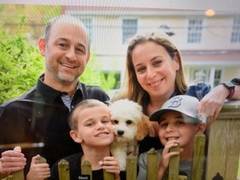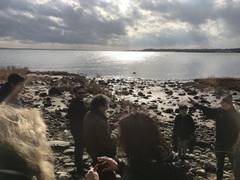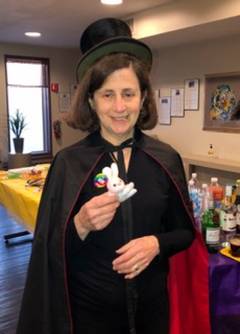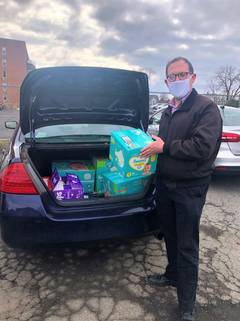D'varim 5778: Thoughts and Prayers
08/07/2018 09:26:51 PM
| Author | |
| Date Added | |
| Automatically create summary | |
| Summary |
Devarim/ Shabbat Hazon 2018
How? How can this be? How can it have come to this? Today, on this Shabbat Hazon, we find ourselves in the midst of three great “hows” of lament that reverberate from the past. First, there was the “How” of Moses in this week's Torah portion, Devarim, the beginning of the book of Deuteronomy. “How can I bear unaided the trouble of you, and the burden, and the bickering” (Deut. 1:12), Moses exclaims. Moses spends his entire day adjudicating disputes among the quarrelsome people, and eventually creates a whole judicial system to ease the burden on him. A midrash (Pesikta de Rav Kahan 15:6) compares this “how” to a noblewoman at the time of her ease and happiness. At this point in our sacred story, there were problems, but they had straightforward solutions. Things were good.
Our haftarah includes the second “How” of Isaiah. This passage, one of the most intense in our entire cycle of Haftarot, is the third and most forceful of the 3 haftarot leading up to our observance of Tisha B'av tomorrow. Isaiah cries out, “How has the faithful city become like a harlot! It was once filled with justice, righteousness dwelled there; but now, only murderers!” (Isaiah 1:21). That same midrash compares Isaiah's “how” to someone observing a noblewoman acting recklessly, making bad decisions in her complacency with the status quo.
Finally, tomorrow, on Tisha B'av, the anniversary of the destruction of the First and Second Temples, and many other tragedies since, we read the third “How” of the book of Lamentations: “How does the city sit solitary, the city that was once full of people!” (Lamentations 1:1). The midrash compares this “how” to a noblewoman observed in her time of misery and degradation, when her bad decisions finally caught up with her.
So, these three “hows”, these three passages from three different sections of the Bible, tell the story of youthful excitement and promise, followed by reckless decisions and destruction. Tomorrow, we will lament and mourn what was lost. We will demand God's comfort and restoration. But today, on this Shabbat Hazon, this Shabbat of Vision, we hear the vision of the prophets, the social critics of their time, decrying the recklessness led up to the ultimate destruction.
The prophet Isaiah lived about a century before the fall of Jerusalem to the Babylonians in 586 BCE. During his lifetime, Assyrian and Aramean armies repeatedly threatened Jerusalem and the southern Kingdom of Judea, having already destroyed and exiled the 10 northern tribes that made up the Kingdom of Israel. Isaiah, inspired by God, foresaw that a similar fate would come to the southern kingdom and the Temple in Jerusalem.
As Isaiah tells it, the Kingdom of Judea was like a diseased tree. Slowly but surely, it had rotted from the inside out, such that it wouldn't take much to topple it over. In particular, Isaiah takes the people to task for their religious hypocrisy. In Isaiah's time, the Temple stood in Jerusalem and continued to operate with exacting precision. The appropriate daily, weekly and yearly sacrifices continued to be offered with meticulous attention to the details we read about in the book of Leviticus. And yet, something about it was off, broken, not quite right. “What need have I of all your sacrifices?” Isaiah hyperbolically declares on God's behalf. “That you come to appear before Me�"Who asked that of you?” Isaiah continues.
Of course, God had asked for the sacrifices, over and over throughout the Torah. But this form of worship had become corrupt because it was not accompanied by righteous action. The people were very attentive to the form of worship commanded by the book of Leviticus. But they had neglected the portions of Leviticus that command ethical behavior. Oppression, lawlessness and neglect of the vulnerable had become rampant in ancient Israelite society. The people and their leaders believed they could act unethically and that somehow God would still be impressed with their displays of pious worship.
But Isaiah reminded the people that such empty worship filled God with loathing. Political corruption dressed up as piety does not impress God. “When you lift up your hands in prayer,” Isaiah warns them, “I will ignore you. Even if you pray at length, I won't listen. Your hands are filled with blood!” (Isaiah 1:15). Instead, Isaiah urges the people: “Learn to do good. Seek justice; aid the wronged. Uphold the rights of the orphan; defend the widow” (17). Isaiah's message is simple. Unless worship is accompanied by righteous action, it is offensive to God. Only when we strive to act with justice, to treat everyone as the image of God that they are, can we claim that our worship is a “sweet savor to the Lord.”
In recent years, a disturbingly common pattern has emerged. Somewhere, on a random day, in a random place, a mass shooting will claim innocent lives in a school or church or other public place. Soon after, politicians and public figures will say that their “thoughts and prayers” are with the victims and their families. But too often, things seem to stop there. Those responsible for making laws and policies to protect us don't appear to have much more to offer than their thoughts and prayers.
Such performative shows of piety, unaccompanied by any real action to improve the situation, bring religion into disrepute. One image passed around after a mass shooting showed an empty moving van. "Excellent news," read the caption. "The first truckload of your thoughts and prayers has just arrived."[1] Too often, prayer become a tool for the powerful to evade responsibility for bringing about peace and justice. Facile resort to prayer makes people of faith seem foolish, like we believe in some cosmic vending machine who will give us exactly what we want if we just press the right buttons.
That said, there is a role for prayer in response to tragedy. There are times when life can feel so overwhelming that the most we feel we can do in the moment is call upon the Master of the Universe for help and guidance. As my colleague Rabbi Jill Jacobs writes, “Prayer frees us from our intellectualizing and rationalizing, breaks down the protective barrier around our hearts, and allows us to voice our pain and anguish.[2]” These are all necessary spiritual tasks in response to tragedy. There may even be moments when God's heart can break open in response to our own broken hearts.
And whether or not our prayers can change God, there is evidence that prayer and meditation can change us. Neurological studies have found that those who prayed regularly were “more focused, less anxious, and felt more connected to other people.[3]” As Christian journalist Katelyn Beaty argues, “Since prayer aids in clear, calm, and empathetic thinking, if we are going to respond well to complicated issues such as gun control, prayer may be more helpful in leading us toward better policy solutions than would an urgent, fretful, ill-considered response.”[4] This, of course, assumes we are dealing with real prayer as part of a regular spiritual practice, not merely as a cliché to be trotted out when convenient. For many faith-based social movements, prayer was part of a strategy for change that took the form, as Beaty writes, of “active wrestling and pleading with the God of the universe to bring justice and peace to the nation and its inhabitants…prayer was action.”
So, prayer may be helpful. It may even be necessary. But as the prophet Isaiah forcefully reminds us in this haftarah, prayer by itself is never sufficient. “Dirshu mishpat; ashru hamotz. Seek justice; aid the wronged.” Unless we commit to seeking justice as our spiritual responsibility, unless we strive to be God's partner in repairing the world in whatever way we think best, then the prayers we intone are not only hollow, but blasphemous.
And yet, Isaiah also reminds us that not all is lost. God, speaking through Isaiah, promises to “And I will restore your judges as at first, and your counsellors as in the beginning; afterwards you shall be called City of Righteousness, Faithful City.” (Isaiah 1:26). Restoration will follow the decline. May we merit to see it speedily, in our day.
Mon, October 27 2025
5 Cheshvan 5786
Photo Gallery
Photo Albums
Upcoming Events
-
Thursday ,
OctOctober 30 , 2025Coffee with the Rabbi
Thursday, Oct 30th 8:00a to 9:00a
Start your morning with some caffeine and casual or meaningful conversation! Join Rabbi Goldberg for a Coffee Chat! Stop by Rye Ridge Starbucks any of the following Thursdays, between 8-9am: June 12 and 26 July 10 and 24 August 7 and 21 September 4 and 18 October 16 and 30 November 6 and 20 December 4 and 18 -
Saturday ,
NovNovember 1 , 2025Dror Israel Shabbat
Shabbat, Nov 1st 11:30a
Dror Israel Shabbat Dror Israel’s Mirit Sulema, along with two leaders of the Arab Youth Movement NOAL, Tal Tunik and Shadi Habiballa, will speak during a Kiddush lunch about their important work with Arab Israeli youth and bringing Jewish, Arab, and Druze youth together. Saturday, November 1st, approx. 11:30am KTI Social Hall "We eat together, laugh together. We talk about what we think of each other, and what will help bring peace.” RSVP Appreciated -
Saturday ,
NovNovember 1 , 2025KTI Gala - A November to Remember Digital Journal
Motzei Shabbat, Nov 1st 7:00p to 10:00p
-
Saturday ,
NovNovember 1 , 2025KTI Gala - A November to Remember
Motzei Shabbat, Nov 1st 7:00p to 10:00p
Saturday, November 1, 2025, 7:00 PM - 10:00 PM Harrison Meadows -
Wednesday ,
NovNovember 5 , 2025Rabbi, May I? Modern Responsa
Wednesday, Nov 5th 10:00a to 11:30a
Wednesdays, 10 - 11:30 AM, KTI Library Ever since Abraham’s famous argument with God, Judaism has been full of debate. Moses and Korah, David and Nathan, Hillel and Shammai, the Vilna Gaon and the Ba’al Shem Tov, Spinoza and the Amsterdam Rabbis . . . the list goes on. No wonder that Judaism cherishes the expression machloket l’shem shamayim, “an argument for the sake of heaven.” Beyond their historical importance, what makes these disputations so compelling is that nearly all of them, regardless of their epochs, are still being argued. The parade of characters spanning three millennia of biblical, rabbinic, and modern disputation reflects the panorama of Jewish history with its monumental political, ethical, and spiritual challenges. This series will examine Jewish responses to exile from the biblical period to our modern day. Considering texts from all genres of Jewish literary creativity, we will explore how the realities and iterpretaions Join as we re-open these timeless debates that lead us to the core of 3,000 years of Jewish conversation. • Justice: Abraham vs. God (October 19) • Holiness and Authority: Moses vs. Korah (November 9) • Inclusion: The Five Daughters vs. the Twelve Tribes (November 30) • Accountability and Morality: David vs. Nathan (December 21) • Resistance: Ben Zakkai vs. the Zealots (January 18) • Law: Hillel vs. Shammai (February 15) • Spirituality: The Vilna Gaon vs. the Baal Shem Tov (March 15) • Boundaries: Spinoza vs. the Amsterdam Rabbis (April 19) • Religious Evolution: Geiger vs. Hirsch vs. Frankel (May 10) • Zionism: Herzl vs. Wise (May 31)
Privacy Settings | Privacy Policy | Member Terms
©2025 All rights reserved. Find out more about ShulCloud






